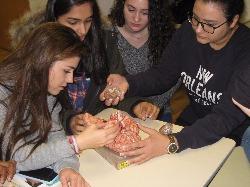Many students when they come to Brampton College think they are revising sensibly by putting in hours just before a test or exam (sometimes staying up most of the night!) However, if this works at all it results in them recalling information for a few hours/days and then forgetting it. This is so counterproductive. Or aim is to teach strategies that allow students to understand and then retain information. I have been encouraging this ‘deep learning’ for many years but recently there is a lot of science research which shows that, when the right strategies are used, students can retain more knowledge.
There are some important principles:
Self-Evaluation: When you start your studies spend time identifying what you do and do not know so you can order your revision to cover the area’s most in need.
Little and often: rather than spending hours on one topic mix your studies up. Your optimum study time is twenty minutes and if you do not change the type of activity your efforts are counterproductive after 45.Study one to three hours every day rather than dong 12 to 14 hours over a weekend! Switch your tasks in these sessions so you keep fully engaged.
Try:
- Looking at new information and try to learn it
- Reviewing previous lessons
- Taking practice exams
- Reading texts
Be holistic: use active techniques like mind maps and making revision cards to integrate the information with the topics you have already studied. Use flash cards and write yourself question and answer information.
Study in groups:
Talking about work with others and asking each other to explain concepts and will improve your understanding.
Talking about work with others and asking each other to explain concepts and will improve your understanding.
Test frequently: At Brampton College we set weekly tests in the final year of A levels. This is a way of helping you revisit work and revise regularly rather than leave everything to the end.
Pace yourself: do not cram! The earlier you start and the more often you revisit a topic the more you will earn. So here is some good advice:
- Look at your notes one or two days after you have done it.
- Revisit it a week later (this is our reason for our weekly tests!)
- Come back to it a month and then three months later
Nearer the exam you should be refreshing your memory on facts you already know
Hopefully, by using all these strategies you will have learnt well and have skills that you will find helpful throughout life and will give you an effective learning technique.




